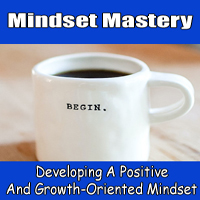


Embracing Self-Confidence And Personal Growth

Doubt is a common human emotion that often creeps into our minds when we face challenges, uncertainties, or the unknown. While doubt can serve as a natural protective mechanism, excessive or unwarranted doubt can hinder our progress and limit our potential. In this article, we will explore the significance of overcoming doubts and strategies for building self-confidence and achieving personal growth.
Understanding Doubt: Doubt is a feeling of uncertainty or lack of conviction about a particular situation, decision, or one's own abilities. It can manifest as self-doubt, where individuals question their own competence or worth, or as doubt about external circumstances, such as the outcome of a decision.
The Impact Of Doubt:
Inaction: Excessive doubt can paralyze us, preventing us from taking necessary actions or making decisions.
Undermined Confidence: Pervasive doubt can erode our self-confidence and self-esteem, making it difficult to believe in our abilities and pursue our goals.
Missed Opportunities: Doubt can lead to missed opportunities for personal and professional growth, as we hesitate to take risks or step outside our comfort zones.
Strategies For Overcoming Doubts:
Self-Awareness: The first step in overcoming doubts is to recognize and acknowledge them. Self-awareness allows us to understand the source of our doubts and work toward addressing them.
Challenge Negative Thoughts: When you experience self-doubt, challenge the negative thoughts that accompany it. Ask yourself if your doubts are based on facts or if they are simply irrational fears.
Positive Self-Talk: Replace self-criticism with positive and encouraging self-talk. Affirm your abilities and remind yourself of past successes.
Set Realistic Goals: Break down your goals into smaller, achievable steps. This can help build confidence by allowing you to see progress along the way.
Seek Support: Share your doubts with trusted friends, family members, or mentors. They can provide valuable perspective and support to help you overcome doubts.
Continuous Learning: Invest in personal development and lifelong learning. Acquiring new skills and knowledge can boost your self-confidence.
Take Action: Often, taking the first step is the most challenging part. Action, even small steps, can help you gain confidence and momentum.
The Benefits Of Overcoming Doubts:
Improved Confidence: Overcoming doubts leads to increased self-confidence, enabling you to tackle challenges with a positive mindset.
Increased Resilience: As you confront doubts and uncertainties, you become more resilient and better equipped to handle setbacks and obstacles.
Personal Growth: Overcoming doubts can be a catalyst for personal growth, as it encourages you to step out of your comfort zone and pursue new experiences.
Achieving Goals: Doubt can often be a barrier to achieving your goals. By overcoming doubts, you can work towards your aspirations with determination and conviction.
Doubts are a natural part of the human experience, but they need not hold you back from achieving your full potential. Overcoming doubts is a transformative process that involves self-awareness, self-compassion, and a commitment to personal growth. By challenging negative thoughts, seeking support, and taking action, you can build self-confidence and develop the resilience to face life's uncertainties with determination and optimism. Remember that doubt is not a sign of weakness but an opportunity for growth and self-discovery.
Cultivating Emotional Well-Being
 Emotional well-being is a complex interplay of various factors, including our ability to manage stress, understand and regulate our emotions, and maintain healthy relationships. Quiet moments play a pivotal role in achieving these emotional goals.
Emotional well-being is a complex interplay of various factors, including our ability to manage stress, understand and regulate our emotions, and maintain healthy relationships. Quiet moments play a pivotal role in achieving these emotional goals.
One of the primary benefits of quiet moments is stress reduction. The relentless pace of life, filled with work deadlines, social obligations, and constant connectivity, can lead to heightened stress levels. Finding time for solitude and silence allows the mind and body to unwind. In these moments, we can relax, breathe deeply, and release tension, which is crucial for emotional well-being.
Moreover, quiet moments provide an opportunity for self-reflection and emotional self-awareness. In the absence of external distractions, we can tune in to our thoughts, feelings, and emotions. This self-reflection can help us identify triggers and patterns in our emotional responses, leading to better emotional regulation and a greater understanding of ourselves.
Quiet moments also foster emotional resilience. When we take time to be alone with our thoughts and emotions, we become better equipped to process difficult experiences and bounce back from adversity. This emotional resilience is vital for maintaining mental and emotional health during life's inevitable challenges.
Furthermore, quiet moments offer a space for gratitude and positivity. By taking a moment to appreciate the present, reflect on our accomplishments, and find joy in the simple things, we cultivate a positive mindset.








Overcoming The Impostor Within
 The Origins Of The Fear Of Being Exposed
The Origins Of The Fear Of Being Exposed
The fear of being exposed often has deep-seated roots in one's psyche. It can stem from childhood experiences, societal pressure, or unrealistic expectations, all of which contribute to a sense of inadequacy. Some individuals develop this fear as a response to external criticism or pressure to conform to unrealistic standards of perfection. As a result, they internalize the belief that they must constantly hide their vulnerabilities to maintain a facade of competence.
Impostor Syndrome And The Fear Of Exposure
The fear of being exposed is a hallmark feature of impostor syndrome, a phenomenon that plagues high-achievers who doubt their own abilities and believe they don't deserve their success. Impostor syndrome often manifests as a fear of being discovered as a fraud, even when external evidence suggests otherwise. The fear of exposure can be particularly paralyzing because it fuels self-doubt and inhibits individuals from fully embracing their accomplishments.
Strategies To Overcome The Fear Of Being Exposed
Acknowledge Your Feelings: The first step to conquering the fear of being exposed is recognizing and acknowledging it. Understand that these feelings are common and do not reflect your true capabilities.
 Understanding The Link Between Procrastination And Success: Procrastination is often seen as the antithesis of success. It's the habit of postponing important tasks, leading to missed opportunities and unfulfilled dreams. In contrast, success is typically associated with discipline, goal setting, and consistent effort. To embark on the road to success, one must confront and overcome the procrastination habit.
Understanding The Link Between Procrastination And Success: Procrastination is often seen as the antithesis of success. It's the habit of postponing important tasks, leading to missed opportunities and unfulfilled dreams. In contrast, success is typically associated with discipline, goal setting, and consistent effort. To embark on the road to success, one must confront and overcome the procrastination habit.
The Journey To Overcoming Procrastination:
Self-Awareness: The first step on the road to success is self-awareness. You must acknowledge and understand your procrastination tendencies. What are your triggers? When do you find yourself procrastinating the most? Self-awareness is the foundation upon which you can build effective strategies to combat procrastination.
Goal Setting: Success is often built upon clear and well-defined goals. Set both short-term and long-term goals that are specific, measurable, achievable, relevant, and time-bound (SMART). When you have a compelling vision of what you want to achieve, it becomes easier to resist the temptation of procrastination.
Time Management: Effective time management is a crucial tool for success. Create schedules and to-do lists to structure your day. Use time management techniques like the Pomodoro Technique to break work into manageable intervals, helping you maintain focus and productivity.
 1. Recharging In Solitude: Introverts have a well-documented need for solitude and personal space to recharge their mental and emotional energy. Privacy is the key to creating this space for themselves, allowing them to unwind, reflect, and regain their vitality. Without these moments of privacy, introverts can feel drained and overwhelmed.
1. Recharging In Solitude: Introverts have a well-documented need for solitude and personal space to recharge their mental and emotional energy. Privacy is the key to creating this space for themselves, allowing them to unwind, reflect, and regain their vitality. Without these moments of privacy, introverts can feel drained and overwhelmed.
2. Self-Reflection And Growth: Personal boundaries give introverts the freedom to engage in self-reflection and personal growth. They can use this space to assess their goals, values, and beliefs, which leads to a deeper understanding of themselves and the world around them. It's in this private realm that they discover their passions and set the course for their life's journey.
3. Creative Freedom: Privacy fosters an environment in which introverts can fully explore their creativity. They often have a rich inner world brimming with imaginative ideas. These personal boundaries offer them the space they need to nurture their creative endeavors without external interruptions or judgments.
Dealing With Painful Memories
 Understanding Painful Memories
Understanding Painful Memories
Painful memories are recollections of past experiences that have caused emotional distress, trauma, or significant discomfort. These memories can be associated with various events, such as personal loss, betrayal, accidents, or any situation that has caused emotional pain. It's important to remember that painful memories are a natural part of life, and we all have them.
Impact On Well-being
Painful memories can have a profound impact on our well-being. They may lead to feelings of sadness, anxiety, anger, or even depression. Repeatedly dwelling on these memories can hinder one's ability to move forward and enjoy a fulfilling life. In extreme cases, they can result in post-traumatic stress disorder (PTSD).
The Power Of Acknowledgment
Acknowledging painful memories is the first step towards healing. Pretending they don't exist or attempting to suppress them often leads to more distress. Instead, it's essential to face these memories head-on and allow ourselves to feel the emotions associated with them. By acknowledging and accepting the existence of painful memories, we create space for understanding and eventual resolution.
Seeking Support
It's important to reach out for support when dealing with painful memories. Whether through friends, family, or professional counseling, talking about these memories can provide a safe and constructive way to process emotions. Support from others can offer new perspectives, empathy, and the comfort of knowing that you're not alone in your struggles.